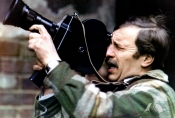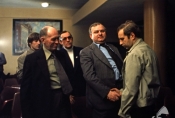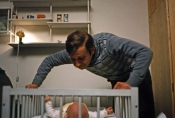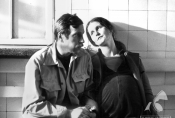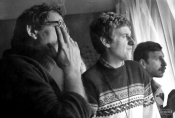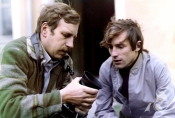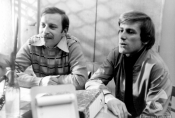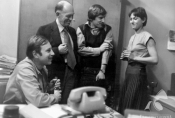CAMERA BUFF [1979]
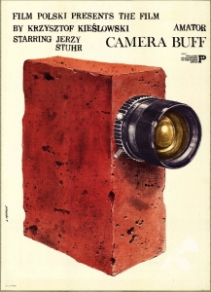
year:
- 1979
release date:
- 16 XI 1979
runtime:
- 117 min
directed by:
- Krzysztof Kieślowski
written by:
- Krzysztof Kieślowski
director of photography:
- Jacek Petrycki
cast:
- Jerzy Stuhr [Filip Mosz], Małgorzata Ząbkowska [Filip's wife], Ewa Pokas [Anna Włodarczyk], Stefan Czyżewski [director], Jerzy Nowak [Osuch], Tadeusz Bradecki [Witek], Marek Litewka [Piotr Krawczyk], Bogusław Sobczuk [TV journalist], Krzysztof Zanussi, Andrzej Jurga, Tadeusz Huk, Teresa Szmigielówna, Alicja Bienicewicz
edited by:
- Halina Nawrocka
music by:
- Krzysztof Knittel
production design:
- Rafał Waltenberger
produced by:
- Zespół Filmowy „Tor”
executive producer:
- Wielisława Piotrowska
awards:
-
- The Koszalin Debut Film Festiwal 'The Young and the Cinema' 1979: Jantar, award for best performance for Jerzy Stuhr
- Polish Feature Film Festival in Gdańsk 1979: Grand Prix, award for the best male actor in a leading role for Jerzy Stuhr
- MFF Moscow (USSR) 1979: Gold Medal, FIPRESCI award
- International Film Forum 'Man – Work – Creativity' Lublin 1979: Audience Award
- MFF Berlin (Germany) 1980: Interfilm Award
- Golden Camera 1980 for debut performance for Tadeusz Bradecki
- MFF Chicago (USA) 1980: Gold Hugo Grand Prix
About the film
It is the pessimistic story of a man who tries to capture the reality surrounding him. At first, he has the support and acceptance of the authorities, but later, when his passion becomes uncomfortable for them, he is rejected and can only talk about himself. In authoritarian regimes, people seeking the truth are doomed to introspection.
Thirty-year-old Filip Mosz lives in a small town, working as a delivery man in a factory. He is the happy father of a baby daughter. He buys a film camera to record the stages of his child’s life on tape. At work, he receives an unexpected proposal from the manager – they want him to film the twenty-fifth anniversary of the factory. The presented material is approved and Filip’s boss suggests that he organize a film club in the factory. The first film made by Filip wins an amateur film festival. From that moment, he is never without his camera. His personal life begins to fall apart. His wife complains about Filip’s constant absence from home and begins to argue with him all the time. Her husband's hobby irritates her. Meanwhile, Mosz films a critical documentary about the town and later makes a film dedicated to an old crippled labourer. He organises a meeting with Krzysztof Zanussi at the club. Soon after, television broadcasts Filip’s documentaries.
The reaction of the town’s residents is positive, but the director is not pleased. He explains to Filip that his films are harmful. Filip tries to oppose the views of the director, but he is not sure of his case himself. Devastated, he decides to give up film-making and spend time with his family. After returning home, he finds out that his wife has left with their child. Filip picks up a camera and starts telling the story of his life looking into the lens.
Joanna Piątek, Leksykon polskich filmów fabularnych, Warszawa 1996
Articles
-
Head of Medusa, or realism in films of the Cinema of Moral Anxiety
Marcin Maron
„Kwartalnik Filmowy” – Special Issue 2013: “Polish Film Scholars on Polish Cinema”
-
Krzysztof Kieślowski: Je t’aime… Moi non plus
Grażyna Arata
Świat według Kieślowskiego/The World According to Kieślowski, Editor: Barbara Kurowska, Publisher: Muzeum Kinematografii w Łodzi, 2011
